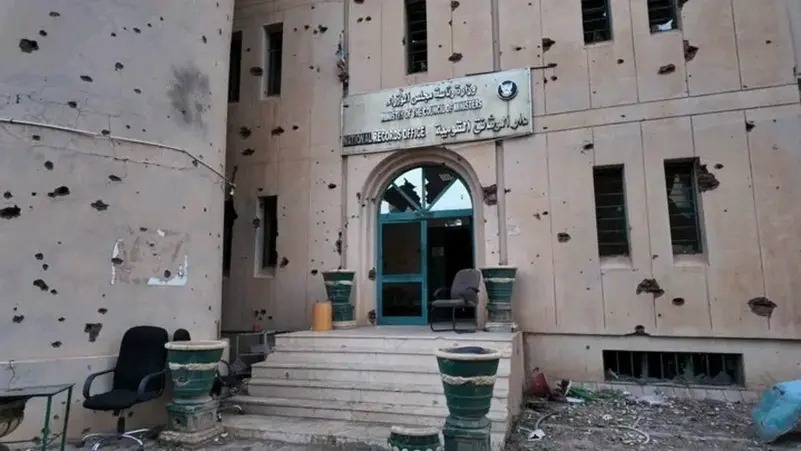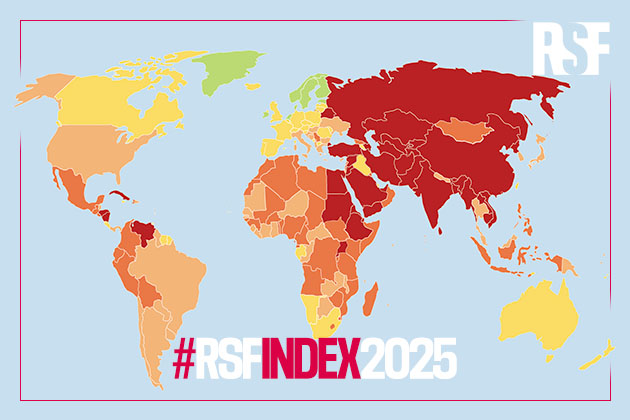2025 World Press Freedom Index: Sudan rates 156th out of 180

The effects of the war appear on the front façade of the headquarters of the Sudanese Archives in Khartoum (Photo: Sudan Media Forum)
While press freedom has been under constant threat and subjected to information control and censorship throughout most of Sudan’s modern history, as the fighting between the Sudanese Armed Forces (SAF) and the Rapid Support Forces (RSF) in April 2023, enters its third year, threats, attacks, and abuses against journalists have become much more frequent, forcing many of them to flee to neighbouring countries.
This bitter reality is clearly reflected in Sudan’s rating at 156th of 180 countries in the 2025 World Press Freedom Index, published annually by the Paris-based advocacy organisation Reporters Without Borders, who lament that while economic fragility a leading threat to press freedom globally, threats, attacks, and abuses against journalists have become more frequent in Sudan.
“Thirty-four countries stand out for the mass closures of their media outlets, which has led to the exile of journalists in recent years,” the advocacy group says, singling out countries “where economic difficulties compound the effects of political pressure,” including Sudan, as well as Nicaragua (172nd, down 9 places), Belarus (166th), Iran (176th), Myanmar (169th), Azerbaijan (167th) and Afghanistan (175th), “where economic difficulties compound the effects of political pressure”.
Sudan’s ranking at 156th shows a drop from 149th in the 2024 index, which had changed little from the 2023 index, 151st in 2022 following the military coup d’état of October 25, 2021, 159 in 2021, but has nominally ‘improved’ from a consistently low rating of around 175th before the overthrow of the Al Bashir dictatorship.
‘During demonstrations, journalists are systematically attacked and insulted, or even arrested and tortured, by both sides in the Sudan war…’ – Reporters Without Borders
“Threats to journalists have intensified in recent years,” Reporters Without Borders says. “During demonstrations, they are systematically attacked and insulted, or even arrested and tortured, by both the regular army and the Rapid Support Forces. Journalists who criticise the authorities or publish compromising documents are monitored. Women journalists, in particular, are subjected to intimidation, threats or reprisals.”
In its Sudan country profile, the advocacy group underscores that “those who harass and attack journalists are protected by the authorities and enjoy total impunity,” confirming that “since the start of the civil war on 15 April 2023, the premises of some media outlets have been attacked and looted, and attacks and abuses against journalists have increased significantly, forcing many of them to flee to neighbouring countries”.
As similarly highlighted by the Sudan Media Forum to mark World Press Freedom Day on May 3, more than 400 journalists have fled to neighbouring countries, at least 31 journalists working in the media field have been killed by the various parties to the conflict, at least 17 others have been detained , while Sudanese media outlets have been forced into in exile, trying to continue operating in extremely difficult conditions.
In the 2025 World Press Freedom Index, Reporters Without Borders warn that “although physical attacks against journalists are the most visible violations of press freedom, economic pressure is also a major, more insidious problem.”
‘The global state of press freedom is now classified as a ‘difficult situation, for the first time in the history of the World Press Freedom Index…’ – Reporters Without Borders
The economic indicator on the World Press Freedom Index now stands at an unprecedented, critical low as its decline continued in 2025, the advocacy group says. As a result, the global state of press freedom is now classified as a “difficult situation” for the first time in the history of the Index.
“Guaranteeing freedom, independence and plurality in today’s media landscape requires stable and transparent financial conditions. Without economic independence, there can be no free press,” says Reporters Without Borders Editorial Director Anne Bocandé. “When journalists are impoverished, they no longer have the means to resist the enemies of the press — those who champion disinformation and propaganda. The media economy must urgently be restored to a state that is conducive to journalism and ensures the production of reliable information, which is inherently costly… The media’s financial independence is a necessary condition for ensuring free, trustworthy information that serves the public interest,” Bocandé says.
‘A climate of fear and repression has prevailed, preventing the press from fulfilling its role in reporting the truth, exposing violations, and informing the public…’ – Sudan Media Forum
World Press Freedom Day”
As reported by Radio Dabanga as the world marked UNESCO World Press Freedom Day 2025 last week, under the theme “Reporting in the Brave New World: The Impact of Artificial Intelligence on Press Freedom and the Media”, Sudan shows the dark side of this transformation where war, disinformation and digital manipulation work together to silence truth.
Whilst the Sudanese Armed Forces have slowly regained control over much of Khartoum, reports are confirming that at least 90 per cent of media, including TV, radio, and newspaper facilities have been completely destroyed during the hostilities, while looters have stripped any usable equipment and assets in the city that has always been Sudan’s main media hub.
Sudan Media Forum
The media landscape in Sudan has transformed into an arena of grave dangers, where journalists and media workers face existential threats and systematic violence from the parties to the conflict,” the Sudan Media Forum warned in a joint statement to mark World Press Freedom Day on May 3.
“These direct violations are coupled with a near-total absence of press freedom and freedom of expression in large parts of Sudan. Severe restrictions have been imposed on media coverage, information has been deliberately withheld, the headquarters of many media institutions have been closed or destroyed, and a climate of fear and repression has prevailed, preventing the press from fulfilling its role in reporting the truth, exposing violations, and informing the public,” the Sudan Media Forum laments.
#SilenceKills #الصمت_يقتل #NoTimeToWasteForSudan #الوضع_في_السودان_لايحتمل_التأجيل #StandWithSudan #ساندوا_السودان #SudanMediaForum #PressFreedom #WorldPressFreedomDay












 and then
and then